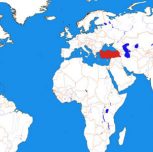The Turkish banking sector, which is the 2nd largest banking system in Emerging Europe after Russia, is well capitalized and highly liquid, allowing it great flexibility to provide financing for investors in the country. In addition to banks, the Turkish credit market allows investors to access to project financing through leasing and factoring companies.
There are three types of banks in Turkey: deposit banks, development/investment banks, and participation banks, which carry their activities based on interest-free banking in compliance with globally accepted Islamic finance principles. Banks may issue cash loans, non-cash loans, and interest-free (participation) loans in both local and foreign currency to legal entities and real persons; however, they are not allowed to make foreign currency loans to real persons for non-commercial purposes. In addition, residents in Turkey are obliged to use banks established in Turkey as intermediary institutions to receive loans from abroad.
Other financing methods include leasing and factoring. Leasing could be in the form of a domestic lease, a cross-border lease, a sale and lease back, or a sales-aid lease. Real estate, automobiles, computers, office equipment, medical equipment, construction machinery, manufacturing machinery, and other fixed assets may be obtained through leasing. Factoring companies, meanwhile, actually purchase receivables documented by invoices arising from goods and services sold and therefore assume the risk of payment.
In addition to Turkey-based financial institutions, several international developments banks, such as the European Bank for Reconstruction and Development (EBRD), the European Investment Bank (EIB), and the International Finance Corporation (IFC) also provide funding for many investment projects in Turkey.
Banking Regulation and Supervision Agency: www.bddk.org.tr
Banks Association of Turkey: www.tbb.org.tr
EIB: www.eib.org
IFC: www.ifc.org
EBRD: www.ebrd.com










